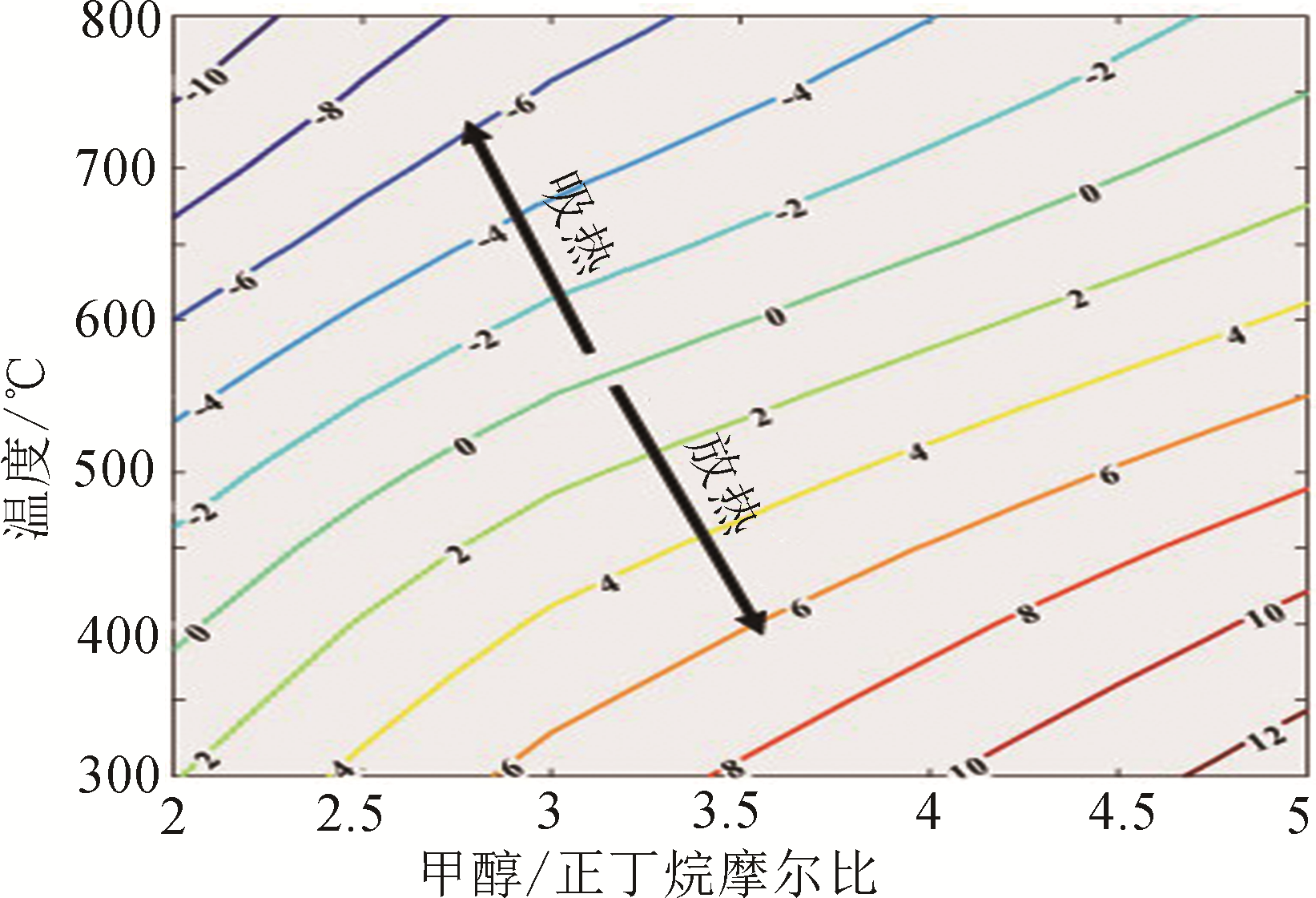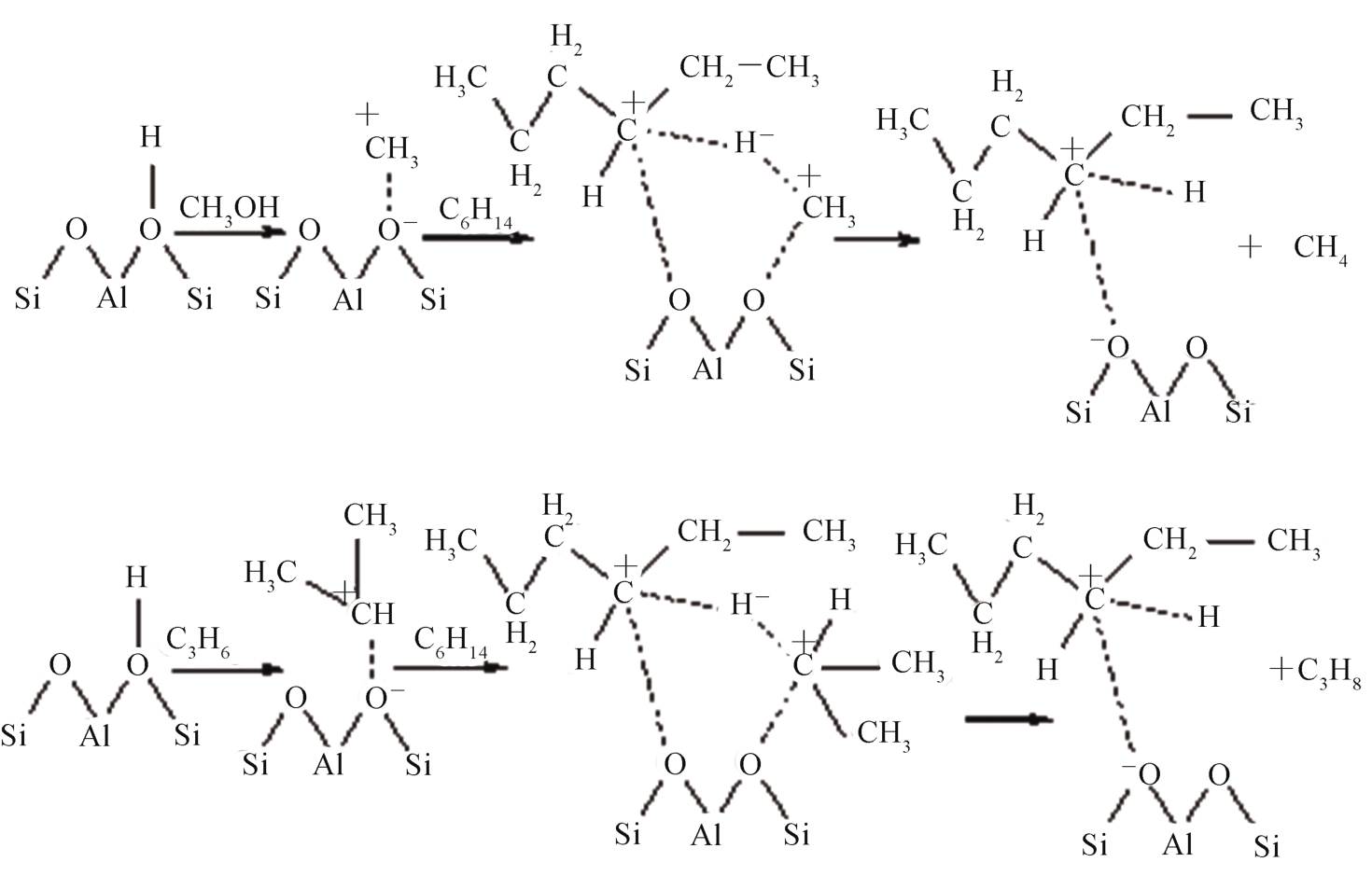| 1 |
WEI Z, XIA T, LIU M, et al. Alkaline modification of ZSM-5 catalysts for methanol aromatization: the effect of the alkaline concentration[J]. Frontiers of Chemical Science & Engineering, 2015, 9(4): 450-460.
|
| 2 |
XU S, ZHANG X, CHENG D, et al. Effect of hierarchical ZSM-5 zeolite crystal size on diffusion and catalytic performance of n-heptane cracking[J]. Frontiers of Chemical Science & Engineering, 2018, 12(4): 780-789.
|
| 3 |
GAYUBO A, VALLE B, AGUAYO T, et al. Attenuation of catalyst deactivation by cofeeding methanol for enhancing the valorisation of crude bio-oil[J]. Energy & Fuels, 2009, 23: 4129-4136.
|
| 4 |
LÜCKE B, MARTIN A, GÜNSCHEL H, et al. CMHC: coupled methanol hydrocarbon cracking formation of lower olefins from methanol and hydrocarbons over modified zeolites[J]. Microporous and Mesoporous Materials, 1999, 29: 145-157.
|
| 5 |
MIER D, GAYUBO G, AGUAYO A, et al. Olefin production by cofeeding methanol and n-butane: kinetic modeling considering the deactivation of HZSM-5 zeolite[J]. AIChE Journal, 2011, 57(10): 2841-2853.
|
| 6 |
BAI T, ZHANG X, LIU X, et al. Coupling conversion of methanol and 1-butylene to propylene on HZSM-5 molecular sieve catalysts prepared by different methods[J]. Korean Journal of Chemical Engineering, 2016, 33(7): 2097-2106.
|
| 7 |
LIU X, BAI T, WANG F, et al. Coupling conversion of 1-butylene and methanol to propylene over superfine HZSM-5 catalysts[J]. Advanced Materials Research, 2014, 962-965: 723-726.
|
| 8 |
MIER D, AGUAYO A, GAYUBO A, et al. Catalyst discrimination for olefin production by coupled methanol/n-butane cracking[J]. Applied Catalysis A: General, 2010, 383: 202-210.
|
| 9 |
SAFOMOVA S, KOVAL L, EROFEEV V, et al. Catalysic activity of Ga-containing zeolite catalysts in the coupled reforming of methanol and C3-C4 alkanes[J]. Theroretical Foundations of Chemical Engineering, 2008, 42(5): 550-555.
|
| 10 |
WANG Z, JIANG B, LIAO Z, et al. Enhanced reaction performances for light olefin production from butene through cofeeding reaction with methanol[J]. Energy Fuels, 2018, 32(1): 787-795.
|
| 11 |
TAGIEV D, AGAEVA S, ABASOV S, et al. Conjugate conversion of methanol and n-butane on zinc-zirconium catalysts[J]. Russian Journal of Applied Chemistry, 2013, 86(5): 733-738.
|
| 12 |
MARTIN A, NOWAK S, LÜCKE L, et al. Coupled conversion of methanol and C4-hydrocarbons (CMHC) on iron-containing ZSM-5 type zeolites[J]. Applied Catalysis, 1990, 57(1): 203-214.
|
| 13 |
SUN X, MUELLER S, SHI H, et al. On the impact of co-feeding aromatics and olefins for the methanol-to-olefins reaction on HZSM-5[J]. Journal of Catalysis, 2014, 314: 21-31.
|
| 14 |
WEI S, XU Y, JIN Z, et al. Co-conversion of methanol and n-hexane into aromatics using intergrown ZSM-5/ZSM-11 as a catalyst[J]. Frontiers of Chemical Science and Engineering, 2020, 1: 1-10.
|
| 15 |
WEI S, XU Y, CHE C, et al. Fast and simple synthesis of hierarchical ZSM-11 and its performance in the cofeeding reaction of methanol and n-hexane[J]. Reaction Kinetics, Mechanisms and Catalysis, 2019, 127: 803-823.
|
| 16 |
DAI W, YANG L, WANG C, et al. Effect of n-butanol cofeeding on the methanol to aromatics conversion over Ga-modified nano H-ZSM-5 and its mechanistic interpretation[J]. ACS Catalysis, 2018, 8: 1352-1362.
|
| 17 |
SONG C, LIU K, ZHANG D, et al. Effect of cofeeding n-butane with methanol on aromatization performance and coke formation over a Zn loaded ZSM-5/ZSM-11 zeolite[J]. Applied Catalysis A: General, 2014, 470: 15-23.
|
| 18 |
SONG C, LI X, ZHU X, et al. Influence of the state of Zn species over Zn-ZSM-5/ZSM-11 on the coupling effects of cofeeding n-butane with methanol[J]. Applied Catalysis A: General, 2016, 519: 48-55.
|
| 19 |
AGUAYO A, CASTAÑO P, MIER D, et al. Effect of cofeeding butane with methanol on the deactivate by coke of a HZSM-5 zeolite catalyst[J]. Industrial & Engineering Chemistry Research, 2011, 50: 9980-9988.
|
| 20 |
GONG T, ZHANG X, BAI T, et al. Coupling conversion of methanol and C4 hydrocarbon to propylene on La-modified HZSM-5 zeolite catalysts[J]. Industrial & Engineering Chemistry Research, 2012, 51: 13589-13598.
|
| 21 |
MIER D, AGUAYO A, GAYUBO A, et al. Synergies in the production of olefins by combined cracking of n-butane and methanol on a HZSM-5 zeolite catalyst[J]. Chemical Engineering Journal, 2010, 160: 760-769.
|
| 22 |
YANG K, ZHU L, ZHANG J, et al. Co-aromatization of n-butane and methanol over PtSnK-Mo/ZSM-5 zeolite catalysts: the promotion effect of ball-milling[J]. Catalysts, 2018, 8: 307-327.
|
| 23 |
CHANG F, WEI Y, LIU X, et al. An improved catalystic cracking of n-hexane via methanol coupling reaction over HZSM-5 zeolite catalysts[J]. Catalysis Letter, 2006, 106: 171-176.
|
| 24 |
CHANG F, WEI Y, LIU X, et al. A mechanistic investigation of the coupled reaction of n-hexane and methanol over HZSM-5[J]. Applied Catalysis A: Genernal, 2007, 328: 163-173.
|
| 25 |
ROOHOLLAHI G, KAZEMEINI M, MOHAMMADREZAEE A, et al. The joint reaction of methanol and i-butane over the HZSM-5 zeolite[J]. Journal of Industrial and Engineering Chemistry, 2013, 19: 915-919.
|
| 26 |
SONG C, LIU Si, LI X, et al. Influence of reaction conditions on the aromatization of cofeeding n-butane with methanol over the Zn loaded ZSM-5/ZSM-11 zeolite catalyst[J]. Fuel Processing Technology, 2014, 126:60-65.
|
| 27 |
SU C, QIAN W, XIE Q, et al. Conversion of methanol with C5-C6 hydrocarbons into aromatics in a two-stage fluidized bed reactor[J]. Catalysis Today, 2016, 264: 63-69.
|
| 28 |
胡徐腾. 天然气制乙烯技术进展及经济性分析[J]. 化工进展, 2016, 35(6): 1733-1738.
|
|
HU Xuteng. Technology progress and economy analysis on natural gas to ethylene[J]. Chemical Industry and Engineering Progress, 2016, 35(6): 1733-1738.
|
| 29 |
温倩. 甲醇芳构化技术和经济性分析[J]. 煤化工, 2012 (2): 1-4.
|
|
WEN Qian. Technical and economic analysis of the aromatization of methanol[J]. Coal Chemical Industry, 2012 (2): 1-4.
|
 ), 徐亚荣2(
), 徐亚荣2( ), 聂宏元2, 朱学栋1(
), 聂宏元2, 朱学栋1( )
)
 ), Yarong XU2(
), Yarong XU2( ), Hongyuan NIE2, Xuedong ZHU1(
), Hongyuan NIE2, Xuedong ZHU1( )
)


